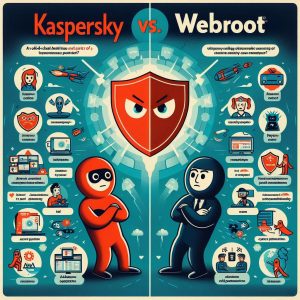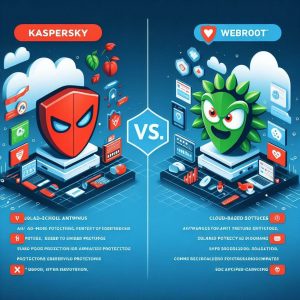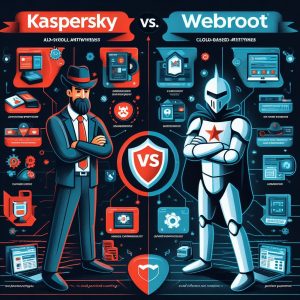I. Introduction
Antivirus software plays a crucial role in securing devices against an array of constantly evolving cyber threats like malware, phishing, and ransomware attacks. With Internet usage, online transactions and reliance on technologies all dramatically rising, ensuring robust protections safeguard sensitive personal and professional data has become pivotal.
Two competitive players in the consumer and commercial antivirus spaces are Kaspersky and Webroot. They have taken unique approaches towards real-time threat detection and prevention reaching millions of home users and global enterprises. This comprehensive review sets them head-to-head across malware defense effectiveness, system performance impact, ease of use, pricing and feature set capabilities so readers can best determine the right platform fitting their household or organizational needs.

II. Kaspersky Antivirus
Celebrating its 25th year in operation, Kaspersky Lab ranks among the most reputable independent cybersecurity vendors internationally. Kaspersky antivirus software solutions deliver proven multi-layered protections across diverse operating systems, devices, and use cases.
Key Highlights:
- Robust core antivirus and anti-malware technology
- Real-time behavioral analysis and machine learning
- Available for Windows, Mac, Android, iOS devices
- Secured over 400 million global systems
- User-friendly interface and workflows
- Light footprint minimizes performance impact
- Priced competitively in consumer tier
Reviewers consistently highlight Kaspersky’s high malware detection rates based on independent lab testing results coupled with its low system resource usage. In comparison with platforms like Norton or McAfee, Kaspersky excels at avoiding performance slow downs across boots, shutdowns and active workflow tasks which users appreciate.
Those relying on Windows PCs in particular should experience crisp, responsive behavior keeping Kaspersky continuously running in the background. Overall an intuitive, light-touch security solution protecting across many device types.
III. Webroot Antivirus
Initially launching in 1997, Webroot takes a decidedly different approach to endpoint security by combining the lightest system footprint with real-time threat intelligence to prevent malware and phishing attacks. Instead of traditional signature-based virus scanning, Webroot focuses behavior monitoring and machine learning to detect threats.
Key Highlights:
- Real-time threat intelligence capabilities
- Minimal system performance impact at under 2MB size
- Proprietary machine learning algorithms
- Phishing Protection and Form Filling tools
- Windows and Mac OS supported
- Gamer Mode to suspend monitoring
- Competitively priced
This process captures emerging zero-day threats faster while enabling Webroot’s tiny local agent to identify malicious processes in milliseconds without taxing CPU or memory. Users report blazing fast 60-second installs followed by imperceptible background activity securing endpoints.
Gamers in particular applaud Webroot for avoiding any performance drops during intense graphical workloads. The tradeoff lies in a simplified, streamlined interface less enterprise manageable yet still intuitive. Teams seeking robust yet featherlight endpoint security find excellent value here.

IV. Comparison of Kaspersky and Webroot
Evaluating Kaspersky vs Webroot more closely across vital performance categories including malware prevention, resource usage, ease of use and bottom line value reveals where each solution shines brightest for consumers and business buyers.
Malware Protection
- Kaspersky consistently earns top rankings across independent malware exposure testing – blocking 99.6% of threats based on recent AV-Test evaluations where signature updates and real-time data monitoring prevented nearly all malware infections.
- Webroot takes an entirely different approach by instead utilizing real-time threat intelligence capabilities to instantly identify malicious processes the moment they trigger suspicious behaviors without needing broad local signature databases for detection.
- Both Kaspersky and Webroot deliver excellent protection, just via unique methods. For the highest catch rates based on lab evaluations, Kaspersky rates a slight edge currently.
Performance Impact
- Kaspersky garners attention for minimal processing overhead during active scanning activity despite its robust threat database. Only minor hits to benchmark boot times and software launch speeds position it favorably.
- Webroot’s ultra-lightweight local agent uses almost no device memory or processing capability leading to rave user reviews. Negligible performance impact delivers buttery smooth gaming and workflow experience. Webroot clearly leads this category.
User Experience
- Kaspersky makes managing security straightforward through its conveniently centralized console delivering clear visibility into protections. Controls and notifications remain intuitive even for non-technical audiences.
- Webroot’s dashboard takes extreme simplicity even further, potentially too barebones for some organizations. But home users embrace the non-existent performance drag and low management needs. Hence mixed perspectives on user experience.
Pricing Value
- Kaspersky Internet Security rings up very affordable around $50 per year for a single device license during seasonal sales, while scaling to add more devices makes it a reasonable family or business choice cost-wise.
- Webroot’s ultra-light footprint corresponds with highly budget-friendly annual pricing in the $30 range for individual device users, extending up to cover 3-5 devices on average for under $80 which proves very modest compared to the competitive landscape. Strong value pricing clearly places Webroot ahead.
V. Conclusion
In summary, Kaspersky Antivirus and Webroot take divergent approaches ending up with differentiated strengths better suited for particular user preferences:
Kaspersky shines brightest delivering meticulous malware protection stemming from its long tenure refining signatures and threat behavioral analysis through a conveniently streamlined interface, reasonable pricing, and moderate system performance impact. Households and businesses seeking robust security from a proven brand find confidence here.
Webroot conversely innovates by eschewing cumbersome signature databases to instead rely on lightning quick real-time threat intelligence coupled with a nearly non-existent local software agent burning barely any endpoint resources. Economically priced and incredibly fast, Webroot appeals to buyers unaffected by its deliberate lightweight interface prioritizing performance over configurability.
Based on specific risk tolerance, system performance priorities, and pricing constraints – consumers can confidently select either award-winning Kaspersky or rapid-response threat prevention trailblazer Webroot as a trusted antivirus partner keeping sensitive personal and professional data secured through their uniquely different but similarly potent solutions.
